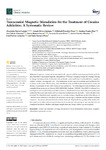Mostrar o rexistro simple do ítem
Transcranial Magnetic Stimulation for the Treatment of Cocaine Addiction: A Systematic Review
| dc.contributor.author | Torres-Castaño, Alezandra | |
| dc.contributor.author | Rivero-Santana, Amado | |
| dc.contributor.author | Perestelo-Pérez, Lilisbeth | |
| dc.contributor.author | Duarte-Díaz, Andrea | |
| dc.contributor.author | Toledo-Chávarri, Ana | |
| dc.contributor.author | Ramos-García, Vanesa | |
| dc.contributor.author | Álvarez-Pérez, Yolanda | |
| dc.contributor.author | Cudeiro, Javier | |
| dc.contributor.author | Padrón-González, Iván | |
| dc.contributor.author | Serrano-Pérez, Pedro | |
| dc.date.accessioned | 2022-03-14T09:20:12Z | |
| dc.date.available | 2022-03-14T09:20:12Z | |
| dc.date.issued | 2021-11-28 | |
| dc.identifier.citation | Torres-Castaño A, Rivero-Santana A, Perestelo-Pérez L, Duarte-Díaz A, Toledo-Chávarri A, Ramos-García V, Álvarez-Pérez Y, Cudeiro-Mazaira J, Padrón-González I, Serrano-Pérez P. Transcranial Magnetic Stimulation for the Treatment of Cocaine Addiction: A Systematic Review. J Clin Med. 2021 Nov 28;10(23):5595. | es_ES |
| dc.identifier.issn | 2077-0383 | |
| dc.identifier.uri | http://hdl.handle.net/2183/29976 | |
| dc.description.abstract | [Abstract] Long-term cocaine use is associated with cognitive deficits and neuro-psychiatric pathologies. Repetitive transcranial magnetic stimulation (rTMS) is an emerging therapeutic strategy relating to changes in brain activity. It stimulates the prefrontal cortex and is involved in inhibitory cognitive control, decision making and care. This systematic review aims to evaluate and synthesize the evidence on the safety, effectiveness, and cost-effectiveness of rTMS for the treatment of cocaine addiction. A systematic review of the literature was carried out. The following electronic databases were consulted from inception to October 2020: MEDLINE, Embase, CINAHL, PsycINFO, Cochrane Central Register of Controlled Trials and Web of Science. Randomised controlled trials, non-randomised controlled trials and case-series and full economic evaluations were included. Twelve studies were included. No identified study reported data on cost-effectiveness. Significant results of the efficacy of TMS have been observed in terms of the reduction of craving to consume and the number of doses consumed. No serious adverse effects have been observed. Despite the low quality of the studies, the first results were observed in terms of reduction of cocaine use and craving. In any case, this effect is considered moderate. Studies with larger sample sizes and longer follow-ups are required. | es_ES |
| dc.language.iso | eng | es_ES |
| dc.publisher | MDPI | es_ES |
| dc.relation.uri | https://doi.org/10.3390/jcm10235595 | es_ES |
| dc.rights | Creative Commons Attribution 4.0 International License (CC-BY 4.0) | es_ES |
| dc.rights.uri | http://creativecommons.org/licenses/by/4.0/ | * |
| dc.subject | Cocaine use disorder | es_ES |
| dc.subject | Craving | es_ES |
| dc.subject | Non-invasive brain stimulation | es_ES |
| dc.subject | Transcranial magnetic stimulation | es_ES |
| dc.subject | Systematic review | es_ES |
| dc.title | Transcranial Magnetic Stimulation for the Treatment of Cocaine Addiction: A Systematic Review | es_ES |
| dc.type | info:eu-repo/semantics/article | es_ES |
| dc.rights.access | info:eu-repo/semantics/openAccess | es_ES |
| UDC.journalTitle | Journal of Clinical Medicine | es_ES |
| UDC.volume | 10 | es_ES |
| UDC.issue | 23 | es_ES |
| UDC.startPage | 5595 | es_ES |
| dc.identifier.doi | 10.3390/jcm10235595 |







